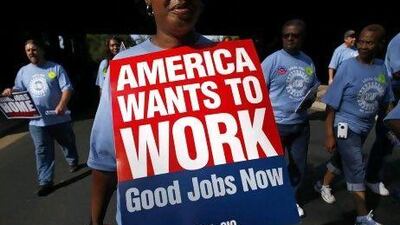Global stock markets rallied and Brent crude hit a four-month high of US$117.95 (Dh433.23) a barrel as analysts cautiously welcomed the US Federal Reserve's decision to launch an aggressive stimulus programme that will see it pump $40 billion into the world's top economy every month until there are signs of a recovery.
Ben Bernanke, the Fed chairman, said the central bank would purchase mortgage-backed securities until it saw a turnaround in the country's weak jobs market, which has been hovering above the 8 per cent unemployment mark since 2009.
The Fed's decision to tie its controversial bond buying directly to economic conditions was an unprecedented step that marked a big escalation in its efforts to drive down unemployment and lower mortgage rates to stimulate the housing sector.
"The employment situation ... remains a grave concern," said Mr Bernanke. "While the economy appears to be on a path of moderate recovery, it isn't growing fast enough to make significant progress reducing the unemployment rate."
Some analysts were surprised by the Fed's open-ended quantitative-easing (QE) plan to get the economy back on track. Its two previous bond-buying sprees, dubbed QE1 and QE2, both had end dates.
"Although additional stimulus was expected, the open-ended nature and focus solely on mortgage-backed securities, without including Treasuries, was slightly surprising and introduces additional uncertainty into the process," said Dan Dowding, the chief executive of IFAs Killik & Co in Dubai.
But he added that the Fed would be pumping a lot more than $40bn into the ailing economy every month.
"Don't forget Operation Twist - the Fed's existing programme of buying long-dated Treasuries," he said. "QE3 combined with Operation Twist means that the Fed will be spending $85 billion a month, at least until the end of the year."
Mr Dowding said the bond-buying spree would expand the Fed's balance sheet, which is currently at $2.85 trillion. "That's something like $9,500 for every man, woman and child in America," he added. "QE3 is a bold move for the Fed and will substantially expand its balance sheet.
"But it was a near unanimous decision with only one dissent, so clearly policymakers believe that they can afford it and make it work."
Last month, the US created only 96,000 jobs, less than what was needed to keep up with population growth. While the unemployment rate edged down to 8.1 per cent, it was only because many Americans had given up on the search for work.
Businesses have held back on hiring and put investment plans on hold out of concern that Europe's debt crisis and the so-called US fiscal cliff of scheduled tax hikes and government spending cuts could derail the economy, economists say.
In Washington yesterday, the commerce department said retail sales rose for the second straight month in August, boosted by cars and high petrol prices. Retail sales increased 0.9 per cent, the largest increase since February, but still too weak to cut into the high unemployment rate.
In an additional move, the Fed said it was not likely to raise interest rates from their current near-zero level until at least mid-2015. It said it would pursue an easy monetary policy "for a considerable time" even after the economy strengthened.
"If the outlook for the labour market does not improve substantially, the committee will continue its purchase of agency mortgage-backed securities, undertake additional asset purchases and employ its other policy tools as appropriate until such improvement is achieved in a context of price stability," the Fed said.
Mr Bernanke said the Fed wanted to see a convincing improvement in the economy that could deliver sustainable job creation. "There's not a specific number we have in mind, but what we have seen in the last six months isn't it," he added.
Global stock markets rallied on the news yesterday, with the Dow Jones industrial average rising 0.17 per cent in early trade. London's FTSE100 was up 1.64 per cent in late afternoon trade, Hong Kong's Hang Seng index closed 2.9 per cent higher and Australia's All Ordinaries Index ended the day up 1.16 per cent.
"The Fed will continue to buy assets if unemployment remains high, which will underpin financial markets and the economy," Mr Dowding said. "This will naturally act as an insurance policy that should encourage investors to invest and consumers to spend, kick-starting the economy, creating more jobs and more income."
* with Reuters


